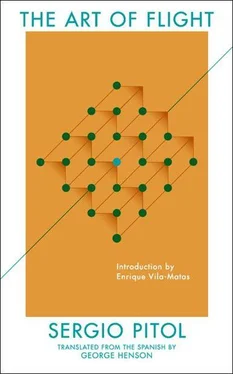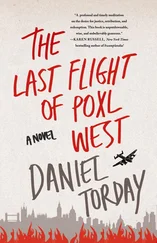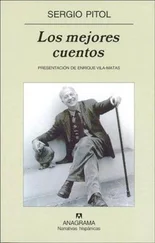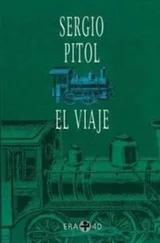Sergio Pitol - The Art of Flight
Здесь есть возможность читать онлайн «Sergio Pitol - The Art of Flight» весь текст электронной книги совершенно бесплатно (целиком полную версию без сокращений). В некоторых случаях можно слушать аудио, скачать через торрент в формате fb2 и присутствует краткое содержание. Год выпуска: 2015, Издательство: Deep Vellum, Жанр: Современная проза, на английском языке. Описание произведения, (предисловие) а так же отзывы посетителей доступны на портале библиотеки ЛибКат.
- Название:The Art of Flight
- Автор:
- Издательство:Deep Vellum
- Жанр:
- Год:2015
- ISBN:нет данных
- Рейтинг книги:5 / 5. Голосов: 1
-
Избранное:Добавить в избранное
- Отзывы:
-
Ваша оценка:
- 100
- 1
- 2
- 3
- 4
- 5
The Art of Flight: краткое содержание, описание и аннотация
Предлагаем к чтению аннотацию, описание, краткое содержание или предисловие (зависит от того, что написал сам автор книги «The Art of Flight»). Если вы не нашли необходимую информацию о книге — напишите в комментариях, мы постараемся отыскать её.
The first work in Pitol's "Trilogy of Memory," The Art of Flight imaginatively blends the genres of fiction and memoir in a Borgesian swirl of contemplation and mystery, expanding our understanding and appreciation of what literature can be and what it can do.
The Art of Flight — читать онлайн бесплатно полную книгу (весь текст) целиком
Ниже представлен текст книги, разбитый по страницам. Система сохранения места последней прочитанной страницы, позволяет с удобством читать онлайн бесплатно книгу «The Art of Flight», без необходимости каждый раз заново искать на чём Вы остановились. Поставьте закладку, и сможете в любой момент перейти на страницу, на которой закончили чтение.
Интервал:
Закладка:
The motive for that trip had been a reading of Bernard Berenson on some peculiarities of the Byzantine legacy in Sicily, illustrated with splendid photographs of the monumental apse at Cefalù. However, just before leaving, I decided to remove Italy from my trip in response to a bitter argument with some elderly aunts, for whom that country, that of our ancestors, was a beacon whose light reached all the way to their home in Colonia del Valle, allowing them to forget at times the thick darkness in which they claimed to be stagnating, in the land of Indians where our ancestors had mistakenly settled. Chance governed, above all else, my stay abroad. I lived, as I have already said, many years in Europe and, yet, I was never able to see the Byzantine apse at Cefalù or the Flemish paintings that I would presumably find in Antwerp. One morning in Paris, in early August 1961, almost without realizing it, I found myself in line at the Italian consulate to apply for a visa to travel to the country I had sworn never to set foot in, and from which, after arriving, it was a year before I was able to extricate myself.
The prelude to my arrival in Europe was marked by that grave international disturbance that involved the building of the Berlin Wall. Many extremely important events took place over the next thirty years; among others, ultimately, the collapse of that wall. But I never witnessed any of them. Either they had just occurred when I arrived somewhere, or they were about to happen as I was about to leave. Only once did I find myself in the middle of a popular uprising. It was in Istanbul. I was traveling with an Englishwoman and a Polish friend as absent-minded as me. Suddenly, we saw an agitated and raucous crowd that spilled out into the streets and squares of the city’s center. There was a constant sound of gunfire; occasionally, groups of police, guns drawn, would stop our taxi, force us to get out, and subject us to a rather thorough body search. The driver acted as if it were a cheerful routine. There was no reason to take the incidents seriously, he told us with a reassuring smile. In the restaurants, the waiters quickly lowered the metal shutters, and we remained locked in for a while, hearing knocks at the door and screams from outside. The headwaiter approached the table with a beaming smile. Nothing was going on, boys playing games, mischief, excessive happiness, everything was in order; it would only be a matter of minutes until we could leave. The same thing happened in the Grand Bazaar, in the museums. There was merrymaking everywhere, singing students, boys roused by the mere joy of being young. Public order was perfect. Under the circumstances, we visited everywhere that the Baedeker guidebook recommended. Any excess was possible, we thought, in that unlikely city, although the noisy eccentricity of local customs and celebrations had begun to wear on us. Days later, far from Turkey, while reading Le Monde , I discovered that my trip to Istanbul had coincided with an attempted coup. The tourist services had worked to perfection, just as in Death in Venice , where everyone, from the manager of the grand hotel to the most humble gondoliers, did everything possible to exaggerate the festive mood so that the tourists would not suspect the city was being ravaged by the plague. In those days of peril, ignorance of civil drama stripped all meaning from the facts. Nothing that I read later about “ les émeutes de Stamboul ” existed as a real experience for me. However, perhaps because of that ambiguous and oblique quality, I introduced Istanbul into one of my novels as a scene that was not intended to be convincing in any way, and the trip on the Marburg , as well as the landing in Bremen, more precisely, have only served me as anecdotes, unable to crystallize into a narrative.
In Europe, I held various jobs, and at times I managed to survive without one. I moved frequently from one side of the famous wall whose appearance marked my arrival to the other. The thread that ties these years together, I’ve always known, is literature. All my personal experiences, in the end, have converged. For many years, my experiences traveling, reading, and writing merged into a single experience. The trains, the boats, and the airplanes have allowed me to discover worlds that were either wonderful or sinister, but all of them were surprising. Travel was the experience of the visible world; reading, on the other hand, allowed me to undertake an inner journey whose itinerary was not confined to space but rather let me move freely throughout time. Reading meant accompanying Mr. Bloom to the taverns of Dublin at the beginning of this century, Fabrice del Dongo through post-Napoleonic Italy, Hector and Achilles through the streets of Troy and the military camps that for many years surrounded it. And writing meant the possibility of embarking toward an elusive goal and fusing — thanks to that dark, inscrutable, and much-talked about alchemy one comes closer to the process of creation — the outside world and that subterranean one that inhabits us.
I was in Germany recently. Passing through Wiesbaden, I set out to find the house where Turgenev lived and wrote most of his work. Suddenly, I came across a raucous protest of neo-Nazi youths who were celebrating the second anniversary of German reunification with a bloodcurdling uproar. The disgust I felt as a result of a protest fraught with violence caused me to abandon my search for the palace where the Russian writer had lived. The next day, at more or less the same time, I was in Milan walking to the church of Santa María delle Grazie to once again see The Last Supper. As I approached the dazzling stonework of that noble building, one of Bramante’s best, I was barely able to contain my excitement. I felt like applauding in front of everyone to celebrate that remarkable triumph of form. In a full state of grace, the march I had witnessed the day before in Wiesbaden crossed my mind. It is impossible to imagine a more crushing disparity! It was revealed to me once more with an almost physical intensity that in the face of a permanent irradiation of works of art, in the face of its finality and fullness, everything else is incidental, tangential, and superficial. Works of art express, and do so once and for all, the best energy humans are capable of producing. Any political episode pales or becomes diluted before the splendor of a work of Palladio, Giorgione, Orozco, or Matisse, in the same way that before a literary work one discovers everything common and irrelevant contained in the language of practical politics, of business, of worldly ceremonies, that language that Galdós defined as “the daily diet and training-school of ordinary minds.” 9
Shortly after having settled in Italy, Bernard Berenson said that man is the perfection of the universe; the spirit, the perfection of man; and art, the combination and summary of all human perfections.
I think about Mikhail Bakhtin, about the many years that the Russian thinker was confined to a tiny village lost in the immensity of the Siberian tundra where he was serving a sentence of banishment. Knowing how to read and write allowed him to survive; in a region of illiterates, he was in charge of drawing up the administrative documents of the local kolkhoz. The living conditions might have been very different from those of Berenson, who wrote in a beautiful castle in Tuscany with the aid of a private library of forty-five thousand volumes, surrounded by paintings and objets d’art and a circle of friends that included several of the most eminent figures of our century. The conclusions of both humanists, however, are similar: ultimately, the spiritual life is the only one that counts. Only the fruits of thought and artistic creation truly justify man’s presence in the world. With an energy characteristic of the Titans, Bakhtin was able to establish a delivery network so that some friends and disciples could send him the materials needed for his research. These were highly specialized books, in six or seven languages, difficult to obtain in Stalin’s Russia. With them, he was about to finish while in Siberian exile a refreshingly learned book: Rabelais and His World , an erudite and passionate defense of the body and the human spirit against all forms of repression and intolerance. In it, the Russian humanist outlines an idea that several decades later thinkers as diverse as the Spaniard María Zambrano and the Pole Leszek Kolakowski would take up: against the discourse of power, the philosopher and the poet would impose the supreme efficacy of the jester’s devices. The steely rigidness of the Prince — his immense power — would be ineffective to the halting step, the astonished gaze, and the vacuous smile of the clown. Nothing irritates the powerful like the ridiculing of their gestures and words, to be transformed not into an object of worship but one of mockery, among other reasons because their language usually exists on the edge of parody. By making a handful of minor alterations and intensifying a few gestures, Chaplin was able to transform a speech by Hitler into a perfect example of the grotesque. Over time, the circumstances surrounding Bakhtin’s life will be remembered as one of many heinous periods that history insists on repeating with mediocre imagination. His books, on the other hand, will remain as an immense triumph of intelligence.
Читать дальшеИнтервал:
Закладка:
Похожие книги на «The Art of Flight»
Представляем Вашему вниманию похожие книги на «The Art of Flight» списком для выбора. Мы отобрали схожую по названию и смыслу литературу в надежде предоставить читателям больше вариантов отыскать новые, интересные, ещё непрочитанные произведения.
Обсуждение, отзывы о книге «The Art of Flight» и просто собственные мнения читателей. Оставьте ваши комментарии, напишите, что Вы думаете о произведении, его смысле или главных героях. Укажите что конкретно понравилось, а что нет, и почему Вы так считаете.












